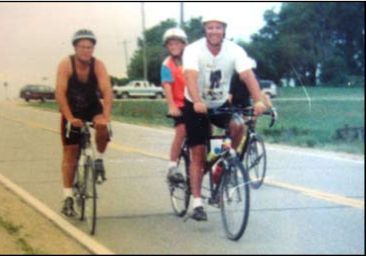
 Some events that cross Iowa or cross our portion of the State have come through Milford Twp. The Des Moines Register's (RAGBRAI) ride has gone through Milford once and on another occasion was one option of routes that went through Story County. An antique tractor parade route went past the School about 2000. The antique tractor boys "nooned" on the Milford School grounds. Loren Book `64N has been on all eleven of these events. A solar powered vehicle caravan went through Milford twice. Once in the mid nineties and the other in circa 1999.
Some events that cross Iowa or cross our portion of the State have come through Milford Twp. The Des Moines Register's (RAGBRAI) ride has gone through Milford once and on another occasion was one option of routes that went through Story County. An antique tractor parade route went past the School about 2000. The antique tractor boys "nooned" on the Milford School grounds. Loren Book `64N has been on all eleven of these events. A solar powered vehicle caravan went through Milford twice. Once in the mid nineties and the other in circa 1999.
and went down by the crib. There was not a sign of anyone around and we were standing about 15 feet from the northwest corner of the crib and all of a sudden here came a flock of rats, perhaps 10 to 15 around the northeast corner of the crib and they were heading our way. Right behind them came my Dad with the other fellows, Dad with a thing that looked like an axhandle and the other guys with scoop shovels. I backed up a few feet but Loyd just stood there. The flock of rats ran around the northwest corner and headed south, except for two of them. They made a beeline for Loyd and, believe it or not, one went up each pant leg. Dad was on the scene immediately, placed his ax handle across Loyd's chest to keep the rats from coming up and perhaps biting him on the neck or head and, faster than it can be told, with one sweep of his arm tore Loyd's overall off him. The rats took off for a well house nearby and the guys got one of them but the other got away. Mom emerged from the house about this time and had some choice words to say to me and Loyd including, but not limited to, "I sure hope you boys learned your lesson!" I don't know if Dad ever said anything to Mom about letting the boys come out there without shoelaces being tied around our britches at the ankles. That incident bothered me more than it did Loyd. To this day, I don't like rats.
Milo Hadley, who lived a mile south of Milford and around the corner to the west, told of the winter of 1936. He talked about how hot it had been the summer before. But, once the snow flew, to get anywhere, you took a bobsled and hooked it behind the team of horses and then you could go most anywhere as the snow had drifted higher than the fences in many places and was so hard the horses wouldn't even break through. This phenomena also produced the unwanted effect that it became very difficult to keep the livestock in the pens as they could simply walk on the snow and get out of their corral. He said that even fat hogs could walk up on the snow in places.
He also told of having a truck load of fat cattle to take to market in the summer of 1935(?). He decided to take them to Chicago because there was a little better price there. He called a trucker and that trucker was more than happy to make the trip because times were tough and he needed to make a few dollars also. Milo rode in the truck to Chicago with the driver and the cattle. He got the livestock sold, finally talked money to the driver, asked how much that would be for the trucking. The trucking cost more than the check Milo got for the cattle! Milo had made his point to me that times were tough and he never added whether he was able to negotiate with the trucker or he had to sell another truck load of cattle to help pay the bill for hauling the first load to Town. That's farming. Hadleys also on page 264.
In March of 1944 Milford township reached the quota for the Red Cross drive. With a goal of $600, Milford turned in about $700. BG Halverson was in charge and Roy Riggs, Oscar Cole, Tom Anderson, Guy Wakefield, Mac Allen, and Casper Egland provided the needed assistance. People knew of the great assistance to the War effort given by the Red Cross to families of Servicemen and to the American Servicemen held in enemy Prisoner of War Camps.